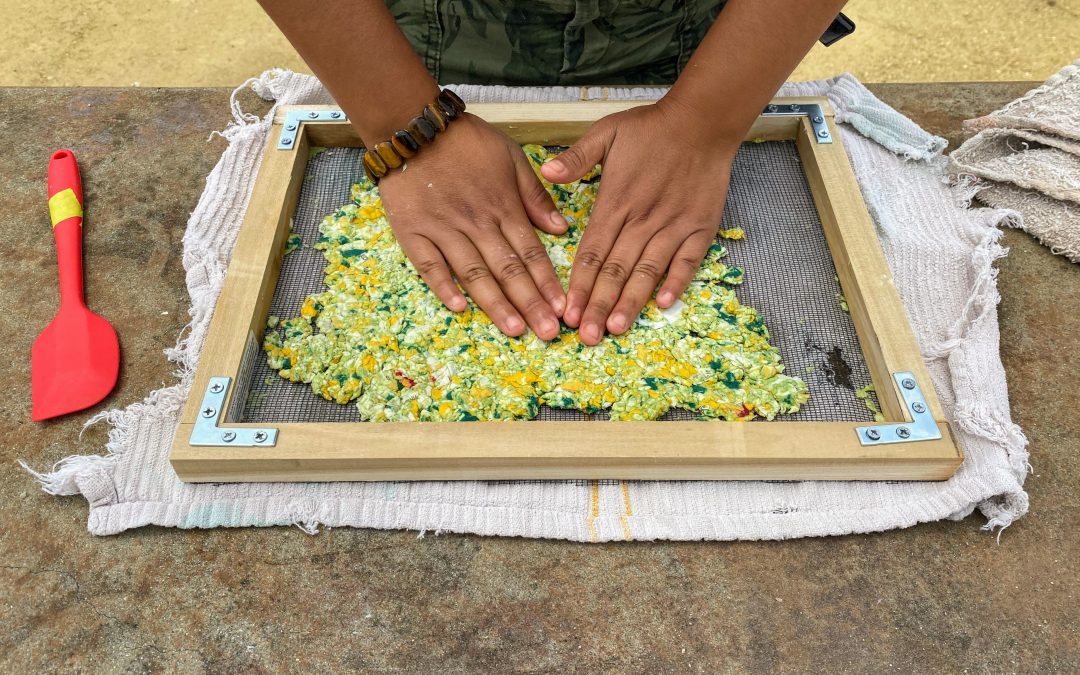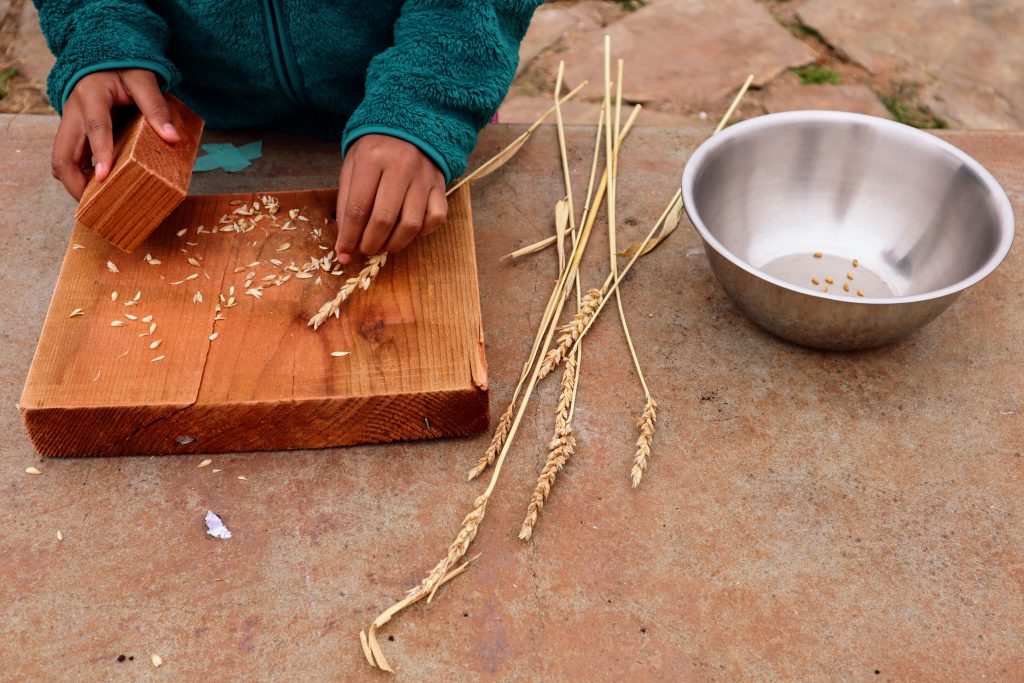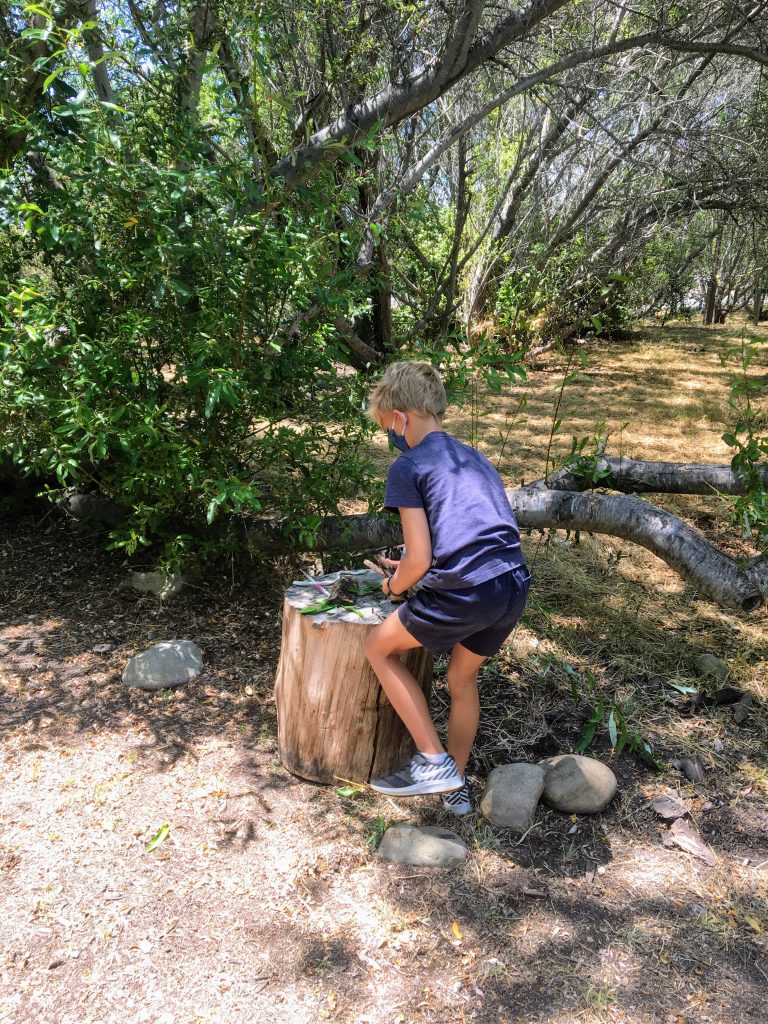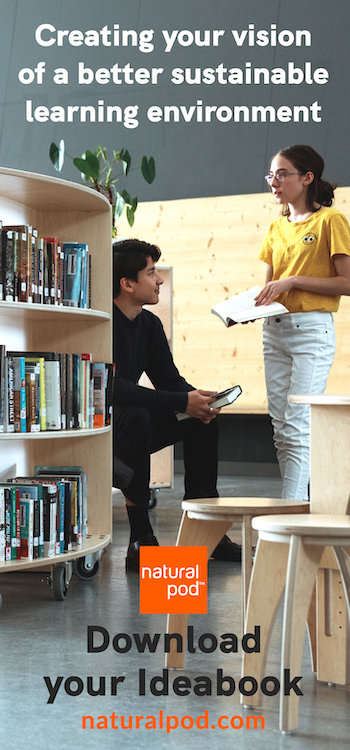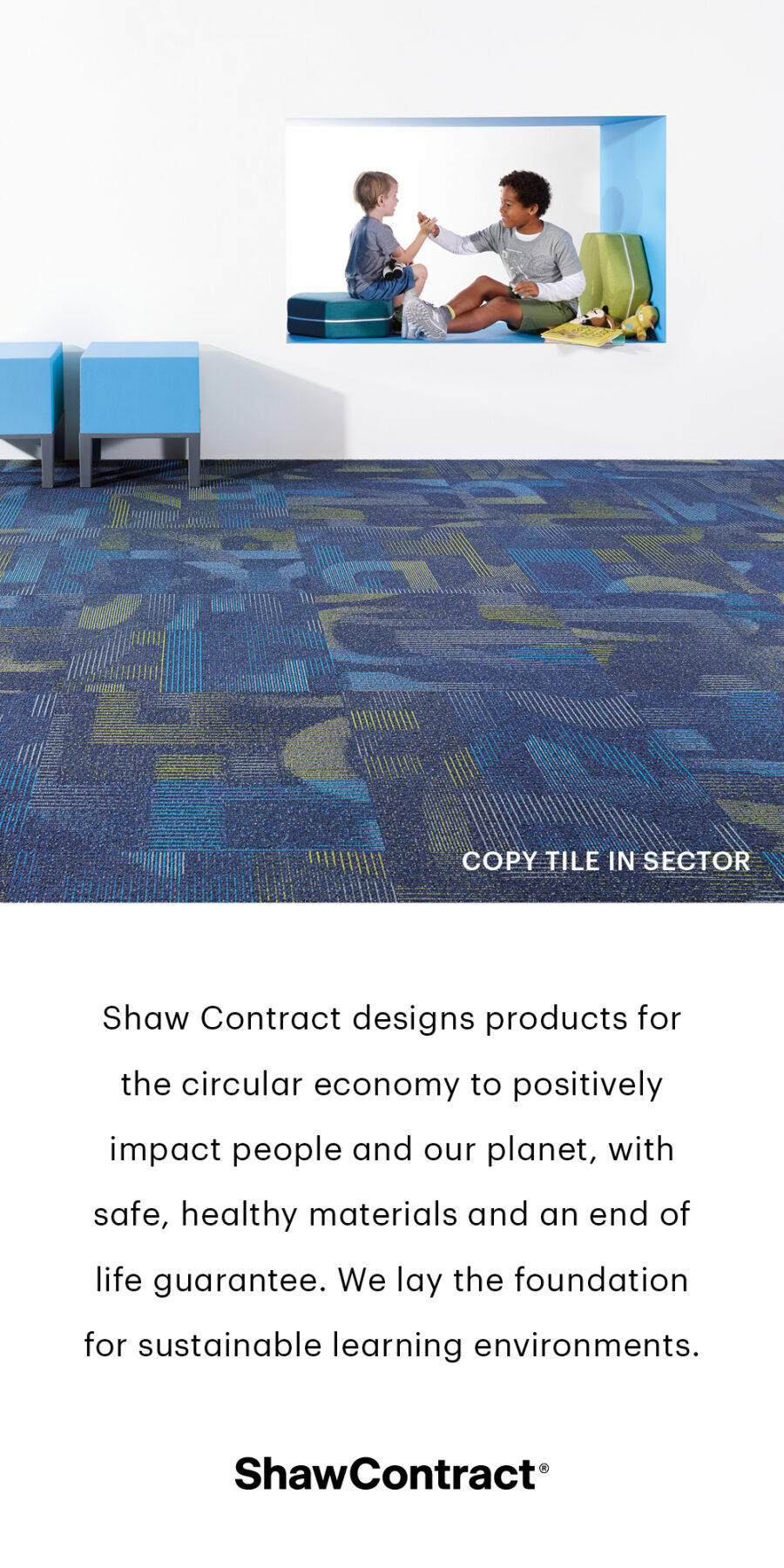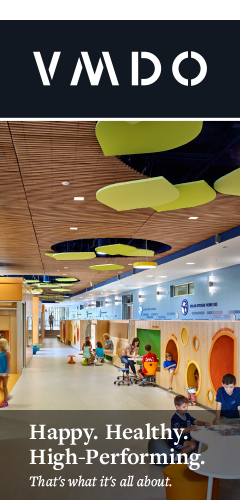By. Benjamin Eichorn, Jennifer Phillips, Leigh Eck, Tiffany Chung, and Nancy Vielmas
The past year has been challenging for school-aged children and their parents and teachers. In this era of virtual learning, young people need to feel connected – connected to each other, to their peers and teachers, to their sense of excitement for learning new things, and to their sense of wonder in exploring the natural world. How do we, as providers of outdoor education, continue to inspire curiosity and provide a platform for “aha!” moments through a screen or from a safe “social distance”?
Nature as Teacher at MEarth
Our philosophy at MEarth is that hands-on, environmental education is one of the best tools there is to inspire young people of all ages, backgrounds, and learning styles to connect with nature, understand their role in natural systems, and become better stewards of the planet. We also believe that the elements and systems found in a garden, a park, a body of water, or an open natural space can enrich and expand learning in any academic subject. It’s no secret that practical experiences – like planting a seed, watching it sprout, and caring for a plant as it grows – leave lasting impressions on children. Using nature as the context for learning and learning by doing are ancient and effective methods for shaping young people into competent and empathetic critical thinkers, doers, and makers.
In a “normal” year, more than 2,500 K-12 youth and 6,000 community members of all ages come to MEarth’s ten-acre restored native habitat and gardens in Carmel, California for school field trips, after school programs, school break camps, and community programs. Our school field trips for grades K-5 offer opportunities for students from all over Monterey County to spend the day exploring our habitat and gardens, making observations of the myriad plants and animals that make their home here, harvesting fresh vegetables from the edible garden, and working in small teams to prepare healthy meals to share with classmates in our LEED-certified, multi-purpose culinary classroom. Lessons teach students the concepts of F.L.0.W.S. (Fresh, Local, Zero-Waste-Systems) to help them understand that fresh foods, grown locally, and those that create minimal waste are best for human health, the health of our local community, and the health of our planet. Our immersion-based after school programs and summer, fall, and spring break camps engage local youth in learning about our local ecosystems and the impact of humans on those systems. Lessons and activities employ a standards-aligned curriculum aimed at getting kids to “think, feel, and wonder” about the observable natural phenomena surrounding them, while digging into hands-on activities like growing, harvesting, and eating fresh food. Together, these experiences reveal the intricate web of relationships that support our local ecosystems and our intimate connections to those systems.
MEarth’s community programs for families and adults include DIY Workshops like DIY Pie, where a local pastry chef leads participants through learning how to make favorite holiday pies from scratch using fresh, locally sourced ingredients. Seasonal Habitat Tours + Workdays invite community members to learn about our native plant habitat, gardens, and programs while lending a hand to property maintenance, and community-focused fundraising events like MEarth Day, an Earth Day celebration, focus on promoting environmentally-conscious living. We also host as many as 600 volunteers throughout any given year for garden and habitat workdays, native nursery workdays coordinated through a partnership with the California Native Plant Society, and other volunteer service opportunities made possible through a partnership with California State University Monterey Bay’s Service Learning programs.
Switching Gears During a Global Pandemic
When shelter-in-place orders were issued in mid-March 2020 by Monterey County health officials, MEarth’s environmental stewardship and volunteer programs came to an abrupt halt. Since then, the name of the game has been “ingenuity.” Without students allowed on-site, we had to completely reinvent our educational model almost overnight. To meet the rapidly increasing need for access to healthy food in our already food-insecure community (including many families we serve through our educational programs), our small team immediately began converting our educational garden into a production garden and joined forces with local community relief organizations and student-led service groups to provide free, fresh produce to families in need. Since March 2020, we’ve donated thousands of pounds of food to families who otherwise wouldn’t have access to fresh, healthy food. For us, this was an important act of stewardship, and one small part in sustaining the learning and success of our young people and their families who are experiencing unprecedented challenges to their financial, physical, and emotional health and well-being.
When it came to restructuring our educational models, the conundrum of how to effectively lead programming that has historically been conducted in real space and in real time was daunting. Shifting our programs into the virtual space ran counter to our instincts and pedagogical approach. As we learned more about the novel coronavirus, it also became clear that if we wanted to continue offering any in-person programs, those too would need to change dramatically. We would have to drastically reduce our class sizes and take all programs completely outdoors, while keeping kids at a safe distance from one another – something that has rarely been the case in our typical hands-on, relationship-centric style of teaching. We would also have to eliminate culinary programming entirely.
Fortunately, our program team is composed of some very talented, “out-of-the-box” thinkers! Since spring 2020, we’ve developed three distinct programming initiatives to ensure we can still reach and support our constituents, even at a distance, while adhering to the strict new protocols aimed at keeping students, families, teachers, and our staff safe.
Grow, Cook, Explore!
One of the first digital learning tools we launched in spring 2020 was a bilingual (English/Spanish), open-source, video-based lesson series for youth and families called Grow, Cook, Explore! This lesson series teaches skills for self-reliance (e.g., growing your own food), how to cook from scratch at home using fresh ingredients, and ways to explore your backyard and local natural spaces using tools of observation.
The abrupt leap into producing quality video content was a big lift for our programming team. One question was continually top of mind: how can we leverage digital learning tools to get kids AWAY from the screen and interacting with the real world? Fortunately, our Program Director, Leigh Eck, has a background in performing arts production and was able to restructure our educators’ workflow and professional development priorities to meet the new demands of presenting programming through a recorded and produced video format. Soon, our educators were developing new skills like filming, recording, and incorporating voiceovers, translation, and video production to create lessons that were not only engaging and informative, but also inspiring young people and their families to explore and experiment in a hands-on way, away from the screen.
The Grow, Cook, Explore! videos were also shared with Carmel Unified School District (CUSD) teachers to enhance their virtual lessons, as we typically serve up to 900 CUSD students each year through nature- and culinary-based lessons that align with their core curriculum. Our Stewardship Educator, Tiffany Chung, says “pre-pandemic, students would often tell me that coming to MEarth was their favorite part of their school day and that their incoming siblings were excited to start middle school because of the opportunity to learn at MEarth. These videos are an effort to reconnect those students to the magic of MEarth while simultaneously making their history and language studies relevant to our current day.” It has been challenging to gauge the effectiveness of these video-based lessons – we have yet to develop a format for surveying participants and garnering feedback – however, CUSD teachers have expressed gratitude for these video lessons as they have versatile practical applications, one being that some students are using them for research projects.
Exploring Ecoliteracy with Boys and Girls Clubs
A second digital learning tool we’ve developed is an after school ecoliteracy course, led synchronously by our Stewardship Educators. The course includes a pilot series that engages third- through fifth-grade members of the Boys and Girls Clubs of Monterey County (BGCMC), a community youth organization that provides enrichment opportunities to under-resourced youth, and a second series that evolved based on what we learned with BGCMC that invites students from throughout the county to participate. This course invites students into a virtual classroom to explore natural systems, cycles, flows, and webs of relationships through hands-on lessons using materials we provide, including a seed-starting kit, compost box-making materials, dissection tools, and worksheets to bring science-based lessons to life in a tangible way. Lessons inspire students to explore outdoors, find examples of things in nature (e.g., decomposing leaves during our decomposition session), and build awareness on where vegetables come from. As sessions progress, we provide materials like seed grab bags, where students get to apply critical thinking skills as they consider how the varying physical structures of different seeds help them grow into living plants. There’s even a session on mushroom dissection to encourage the practice of close observation!
Joe Garcia, a science educator with BGCMC who leads the group of club members who participated in the pilot course, reflected that he “… really enjoyed watching the members dive into plant physiology and be so eager to get their hands dirty and discover something new.” Going forward, this ecoliteracy course will allow us to bring the MEarth experience to a broader demographic of students throughout Monterey County, especially for those who cannot consistently attend programs at our habitat and gardens every week.
Socially-Distanced Summer Camp
Our third programming initiative was a pilot of socially-distanced, in-person programming. The focus of the pilot was our weeklong summer day camps for third- through eighth-graders. Our summer camps are immersive experiences, where educators lead students through outdoor exploration and gardening activities and nature-focused games and art projects. The camps are also a chance for students to bond with peers and spend long days enjoying the outdoors. This past year, we adjusted our camps to align with new guidelines for youth programs (e.g., small student cohorts – one-third normal capacity) and leaned into the challenges posed by physical distancing, mask wearing, and vigilant sanitation procedures to ensure we did our very best to mitigate safety risks for students, families, and staff.
New classroom management practices, in particular, took a front seat. It was hard for our educators to teach subtle natural concepts that usually require close observation, and at times, students’ enthusiasm for exploring was difficult to manage – like when one student caught a lizard and the others rushed over to huddle around her and look at it. Without much precedent to follow, the biggest challenge was figuring out a way to keep students following safe, socially-distant procedures, while also feeling connected, having fun, and staying engaged. This proved difficult with younger students, as instructing them to stay physically distanced was counterintuitive to the typical summer camp experience and the bonding that usually takes place there. Also, many of the younger students required assistance that we couldn’t provide while staying six feet away. Older students were better able to understand and comply with the guidelines, and we could lead them in activities like seed-starting and compost box-making with distanced instruction. Fortunately, our successes outweighed the challenges. We were able to structure a number of engaging outdoor activities that allowed students to experience intimate connections with nature and their peers. Some of these activities included constructing animal shelters out of found materials and sharpening their gardening skills through learning about mulch and its importance to the garden, constructing a trellis for bean plants, and transplanting kale seedlings into a garden bed that we now harvest for weekly food donations.
Adapting Environmental Education for the COVID-19 Era
The multitude of challenges presented by re-working our programming models have been extremely frustrating at times; however, we’ve learned many valuable lessons about how to adapt our programs to meet the ever-changing needs of our students, pandemic or no pandemic. Our educators have seen firsthand the unusual challenges students and families are facing on a daily basis and have been digging deep to come up with fresh ideas to keep students engaged and excited to learn. Here are a few major lessons we’ve learned about conducting environmental stewardship education in the COVID-19 era:
- Lesson #1: Students quickly become exhausted with screens and need movement and interaction. That’s why we’ve structured our lessons so students first sharpen their skills of observation, creativity, and critical thinking before turning to their computers to answer questions about their hands-on experiences using online tools like Mentimeter, and deepen their understanding of concepts like food chains and human impacts on the environment by watching videos of those concepts in action.
- Lesson #2: We need to provide tools that encourage students to interact with the real world, whether in their backyards, in local outdoor spaces, or in the kitchen with their families. Digital tools like our Backyard Nature video series get students excited about exploring their backyards and neighborhood parks.
- Lesson #3: The more we can invite students to interact with each other, our educators, and tangible objects of observation and experimentation, the more excited they are to engage with the lesson and retain information. By leading with wonder and fostering curiosity and creativity during our school break programs, we are building new versions of our programming that feel authentic, exploratory, and highly engaging, all while keeping everyone safe and fostering students’ understanding and compassion for the world around them.
The Future of Outdoor Education at MEarth
As we look ahead and ponder the future of outdoor education and lessons learned in 2020, we are asking ourselves the following questions:
- How can we balance the need for fee-for-service programs to support our organization’s financial health with our priority to offer scholarship-based programs, while operating with a reduced program capacity of 10 versus 30 students per class?
- How do we prepare for the anticipated increased demand for our programs when things open up again?
- It’s widely understood that the pandemic has only widened inequity in the United States. If environmental education isn’t considered “essential” during pandemic times, how do we ensure equity of access to environmental education for students who don’t have access to safe outdoor learning opportunities?
- Should we still plan to offer “virtual” programs once the pandemic has receded and we can resume in-person programs full time?
There’s no way to know when things will go back to “normal” or what the new normal will look like. All we can do is stay focused on the goal of nurturing young people’s sense of wonder and exploration and keep working to inspire people of all ages to be better stewards of themselves, their communities, and the environment. For 2021, we are embarking on new partnerships to support the development and rehabilitation of educational gardens at multiple sites throughout Monterey County, which we are combining with professional development support for classroom teachers, based on lessons learned with socially-distanced and virtual environmental education. With expanded production in MEarth’s garden, we will be able to grow our food donations for local families who will undoubtedly continue to rely on community relief organizations for support in the coming year. And we’ll continue to do the work of reimagining how we can keep people of all ages engaged and connected to their surrounding natural environments.
Disclaimer: MEarth is a 501(c)3 nonprofit that is independent from Carmel Unified School District, even though the organization operates on district property.
Author Bios
Benjamin Eichorn | Executive Director
In 2003, Benjamin had an epiphany while visiting the Hilton Bialek Habitat at Carmel Middle School – if students could grow, harvest, prepare, and eat fresh food together at school, surely they could learn to love eating foods that are better for them and the environment! This realization launched him into a rewarding career in hands-on science and food-based education, first as an Americorps member and garden educator at Chef Alice Waters’ Edible Schoolyard in Berkeley, California, then as founder and CEO of Grow Your Lunch, and presently as Executive Director of MEarth.
Jennifer Phillips | Community Stewardship Manager
Jennifer grew up in St. Louis, Missouri and moved to California in 2012. She discovered a deep passion for growing food, raising animals, building community around sustainability, and living in relationship with the land while completing a transformational long-term Apprenticeship in Organic Gardening and Sustainable Living at Circle Yoga Shala in the Ozark Mountains of Arkansas. Since moving to Carmel Valley, Jennifer and her husband have been working to develop a small-scale organic farm, raising livestock and bees, growing gardens and orchards, and stewarding the land as a sustainable retreat.
Leigh Eck | Program Director
Leigh grew up among the hills, lakes, and farms of rural Upstate New York. Having nurtured a love for the natural sciences and theater throughout high school, Leigh pursued a career in the arts with a BFA in Music Theatre from the Hartt School at the University of Hartford in Connecticut. Before joining MEarth in 2020, Leigh brought her skills in strategic planning, educational program development, and management to UC San Diego as the co-creator and Program Director of the PATHways to STEM Program, a competitive scholarship program for under-resourced and underrepresented minority students in STEM.
Tiffany Chung | Stewardship Educator
Tiffany spends her days dreaming about food, reading about food, cooking food, feeding people food, eating food and, most importantly, sharing her love and passion for food with everyone around her. She believes that food can connect us all and, through food, we can become more environmentally, culturally, politically, and socially aware. She graduated from UC Berkeley with a Chemical Engineering degree and then served in the Peace Corps in Mozambique as a science teacher and worked for a brief stint in pharmaceutical research before landing at MEarth as a Stewardship Educator.
Nancy Vielmas | Stewardship Educator
Nancy earned her B.A. from California State University Monterey Bay in Environmental Studies concentrating in Science for Sustainable Communities. In college, she began exploring the Fort Ord National Monument and fell in love with the natural beauty of the California Central Coast. Connecting to nature has brought Nancy infinite benefits and continues to do so. It has drastically improved her health, her relationship with herself and others, and has made her experience on Earth beautiful and exciting. She enjoys using her natural sciences knowledge and experience in outdoor education to share the wonders of nature with her students.

